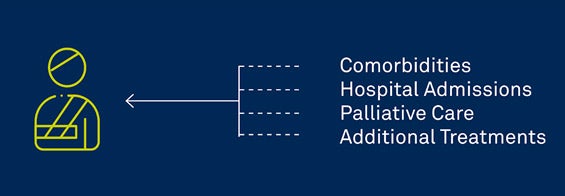How Data Linkage Helps Biopharma Sponsors Quantify Healthcare Resource Utilization (HCRU)

Data linkage—the process of connecting clinical trial data (CTD) and real-world data (RWD) to show a comprehensive view of the patient journey—is shifting the existing paradigm of clinical trials. Whereas CTD and RWD have traditionally existed in silos, a robust data linkage solution helps sponsors overcome these gaps that hinder evidence generation.
With a deeper understanding of patients’ diseases, treatments, and outcomes, data linkage opens up limitless applications for tracking patients lost to follow-up (LTFU), contextualizing patient-reported outcomes, demonstrating treatment effectiveness and cost, and long-term safety monitoring. In the third installment of this four-part blog series, we examine how Medidata Link, the industry’s only scalable data linkage solution, helps sponsors quantify healthcare resource utilization (HCRU).
The Challenge of Qualifying Healthcare Resource Utilization
HCRU variables are crucial endpoints needed to support payer and provider discussions. But because of significant additional burden in data collection, they are not usually captured in clinical trials. To support market access activities, sponsors often rely on extrapolating limited data or waiting years for RWD to accumulate post-commercialization. This lag can lead to a loss of competitive advantage at launch and reduced market penetration.
The Solution
- Sponsors can use linked CTD and RWD to immediately investigate the utilization and cost data appearing in RWD from patients on the trial, rapidly supporting payor and provider discussions rather than waiting years for RWD alone to accumulate.
- Data linkage can bring greater insight into the true costs and burdens associated with inpatient and outpatient activities, as well as prescribing patterns that occur before, during, and after the trial.
- Linked CTD and RWD help illustrate the comprehensive patient pathway to delineate between different sources of cost burden. By measuring HCRU through linked data, sponsors can quantify a therapy’s impact on the healthcare system—particularly in comparison to the standard of care.
- Access to cost data will enable trial cost-effectiveness analyses that are invaluable for early positioning and coverage of novel products.
Sample Use Case – Poor Prognosis Oncology (Pancreatic Cancer)
Although this use case is in oncology, tracking patients LTFU has benefits for trials in a wide range of therapeutic areas across the clinical development life cycle.
A biopharmaceutical company running a Phase III study in pancreatic cancer wants to illustrate the total cost of care for their therapy compared to the standard of care to prepare for payor conversations at launch. Late-stage oncology patients often have poor prognoses and highly variable treatment pathways, particularly towards the end-of-life. Understanding the nuances of HCRU at this stage is extremely important to payors.
Sample Approach
- CTD can be linked to medical claims, pharmacy claims, and EMR to provide a more comprehensive view of cost-of-care and resource utilization variables, such as treatment patterns and duration, outpatient costs, and hospitalizations.
- Linked data can help the sponsor compare their experimental therapy to the standard of care, letting them quantify cost-savings or cost effectiveness of treatment (e.g. reduction in hospital admissions, pharmacy costs).
- Linked CTD and RWD can provide a longitudinal view of the patient journey to enhance long-term outcome monitoring, informing a sponsor’s understanding of HCRU.

Medidata Link accelerates market penetration, giving sponsors enhanced insight into health system burden and experimental therapy performance. By illustrating the comprehensive patient healthcare use and cost, there is an increase in trackable endpoints not normally available in a clinical trial. This makes sure that sponsors do not miss key outcomes and provides payors with a longitudinal view of the economic burden of illness.
Download our eBook for more data linkage use cases to future-proof your clinical trials.
Explore Related Articles
Contact Us


